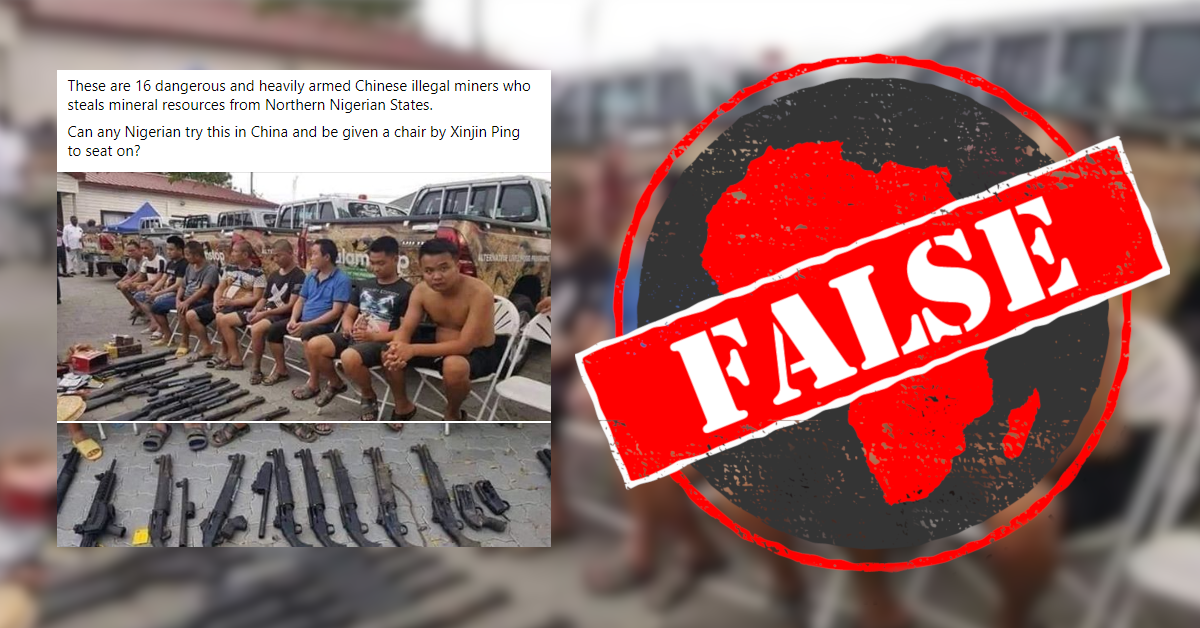“These are 16 dangerous and heavily armed Chinese illegal miners who steals mineral resources from Northern Nigerian States,” reads a Facebook post from 2 May 2020.
It includes a photo of nine men sitting on folding chairs in a car park. On the ground in front of them is a row of shotguns and assault rifles. A second photo shows the guns up close.
The post adds: “Can any Nigerian try this in China and be given a chair by Xinjin Ping to seat on?”
So far, it’s been viewed nearly 170,000 times, with more than a thousand shares.
Northern Nigeria has significant deposits of gold. Does the photo show “Chinese illegal miners” arrested for stealing these resources from northern states?

Using a reverse image search, we traced the two photos to December 2018 news reports from Ghana. Nigeria and Ghana are both in West Africa.
The reports identify the men as “armed illegal Chinese miners arrested in Krobo forest”. They were nabbed by a unit of Ghana’s Inter-Ministerial Committee on Illegal Mining near Obuasi, a mining town in southeastern Ghana. “Some Ghanaian accomplices were also captured in the raid,” says one report.
The Inter-Ministerial Committee on Illegal Mining was set up in 2017 to help enforce Ghana’s laws against small-scale and illegal mining.
On 7 December 2018 the committee posted a live video of the arrested men on its Facebook page. It later posted an account of their arrest, with several photos.
The 16 illegal miners were arrested in southeastern Ghana, in December 2019, not in northern Nigeria.
It includes a photo of nine men sitting on folding chairs in a car park. On the ground in front of them is a row of shotguns and assault rifles. A second photo shows the guns up close.
The post adds: “Can any Nigerian try this in China and be given a chair by Xinjin Ping to seat on?”
So far, it’s been viewed nearly 170,000 times, with more than a thousand shares.
Northern Nigeria has significant deposits of gold. Does the photo show “Chinese illegal miners” arrested for stealing these resources from northern states?

Arrest near Ghanaian mining town
Using a reverse image search, we traced the two photos to December 2018 news reports from Ghana. Nigeria and Ghana are both in West Africa.
The reports identify the men as “armed illegal Chinese miners arrested in Krobo forest”. They were nabbed by a unit of Ghana’s Inter-Ministerial Committee on Illegal Mining near Obuasi, a mining town in southeastern Ghana. “Some Ghanaian accomplices were also captured in the raid,” says one report.
The Inter-Ministerial Committee on Illegal Mining was set up in 2017 to help enforce Ghana’s laws against small-scale and illegal mining.
On 7 December 2018 the committee posted a live video of the arrested men on its Facebook page. It later posted an account of their arrest, with several photos.
The 16 illegal miners were arrested in southeastern Ghana, in December 2019, not in northern Nigeria.
Republish our content for free
For publishers: what to do if your post is rated false
A fact-checker has rated your Facebook or Instagram post as “false”, “altered”, “partly false” or “missing context”. This could have serious consequences. What do you do?
Click on our guide for the steps you should follow.
Publishers guideAfrica Check teams up with Facebook
Africa Check is a partner in Meta's third-party fact-checking programme to help stop the spread of false information on social media.
The content we rate as “false” will be downgraded on Facebook and Instagram. This means fewer people will see it.
You can also help identify false information on Facebook. This guide explains how.





Add new comment